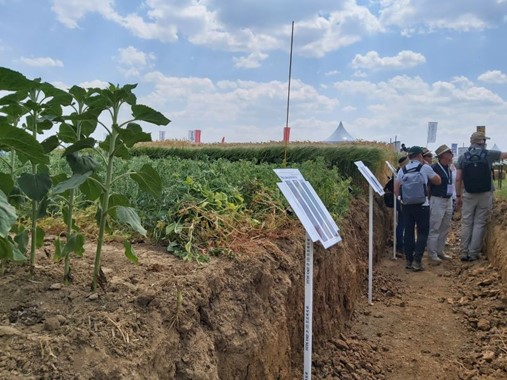
Jülich exceeds expectations with the workshop on Root Phenotyping
The joint initiative of Root2Res, RootEd and WishRoots brought together researchers, students and end-users in a two-day controlled environment demonstration

Sebastian Erdrich – FZ-J
With 58 in person participants and another 20 people registered online, the workshop on Root Phenotyping and Image Analysis held in Jülich proved the relevance of these practices for the agricultural systems of the future. Speakers from 8 different organisations combined theory and practice in a fully packed agenda, covering from nutrient availability to microbiota, from shoveling to imaging. The successful two-day event in a controlled environment is now to be followed by ICARDA with a demonstration on field conditions on February 28th in Morocco.
Learn about Root2Res objectives and partnership
The facilities of the Forschungszentrum Jülich, in the German region of Aachen, witnessed the arrival of fellow researchers and end-users for a live demonstration on the 5th and 6th of February. Although within the context of the second Work Package of Root2Res, dedicated to the Phenotyping Toolbox, the initiative also featured project WishRoots and the doctoral network of RootEd as co-contributors, with invited speakers from the University of Bologna, UC Louvain and the University of Nottingham. The delegation of Root2Res was plentiful on its own: the James Hutton Institute, BOKU, CNR, UFZ and FZ-J themselves addressed the hybrid audience. Besides, the workshop welcomed representatives from Eurofins, PSI and Yara, for the agricultural value chain, and abroad students from the RootEd Winter School.
The Phenotyping Toolbox is a series of innovative techniques for the rapid assessment of root traits in both field and controlled conditions. The in-depth characterization of root and related rhizosphere traits is based on envirotyping data, with three contrasting experimental soils chosen from the projects’ core phenotyping facilities –Arvalis, ADAS, ICARDA, KIS–, each located in a different agroclimatic zone. Root2Res will be presenting these methods next at Sidi el Aidi, Morocco, on the 28th of February.
Two dozen stakeholders are expected to visit ICARDA’s hub, with the International Plant Phenotyping Network (IPPN) funding the travel of two students from the European Union. Root2Res researcher Raffaella Balestrini (CNR) and Project Coordinator Jean-Pierre Cohan (Arvalis) are to accompany the visit, facilitating the exchange on these solutions with researchers, farmers and breeders facing changing environments. These workshops provide valuable information for the widespread adoption of Phenotyping Tools, the characterisation of species and the accuracy of future project trials.
Recent posts





These images were courtesy of Sebastian Erdrich and the Forschungszentrum Jülich

























